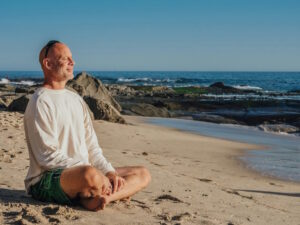
In our fast-paced and often stressful lives, finding effective ways to manage stress and promote relaxation is crucial for our overall well-being. Pilates, an exercise system known for its emphasis on controlled movements, breath awareness, and mindfulness, offers a valuable approach to stress relief and relaxation. In this comprehensive guide, we will explore how Pilates can be an effective tool for reducing stress, why it’s a suitable exercise for relaxation, its potential benefits for managing anxiety and depression, and how it compares to yoga in terms of stress relief.
Is Pilates good for stress relief?
Absolutely, Pilates is a highly effective practice for stress relief. Here’s why:
1. Mind-Body Connection: Pilates encourages a strong mind-body connection, emphasizing mindfulness in movement. This focus on the present moment allows individuals to temporarily set aside stressors and worries, promoting relaxation.
2. Deep Breathing: Pilates incorporates controlled breathing techniques, which can help activate the body’s relaxation response. Deep, intentional breathing lowers stress hormones and induces a sense of calm.
3. Muscle Tension Release: The gentle stretching and controlled movements in Pilates help release tension in the muscles, which can accumulate due to stress. This contributes to physical relaxation.
4. Improved Posture: Pilates promotes better posture and alignment. Stress often leads to slouching and poor posture, and by addressing these issues, Pilates can alleviate physical stress.
5. Endorphin Release: Like other forms of exercise, Pilates triggers the release of endorphins, the body’s natural mood enhancers. These endorphins can reduce stress and improve overall mood.
Incorporating Pilates into your routine, even for a short duration, can provide a welcome break from the demands of daily life, allowing you to unwind and destress.
What is the best exercise for stress and anxiety?
While there isn’t a one-size-fits-all answer to the “best” exercise for stress and anxiety, several activities have been found to be particularly effective in promoting relaxation and reducing stress:
1. Pilates: As discussed, Pilates is an excellent choice due to its focus on mindfulness, controlled movements, and deep breathing.
2. Yoga: Yoga shares similarities with Pilates in terms of breath awareness and mindfulness. It also includes relaxation and meditation techniques that can alleviate stress.
3. Aerobic Exercise: Activities like running, swimming, and cycling can help release endorphins and reduce stress. The rhythmic, repetitive movements can be meditative and calming.
4. Tai Chi: Tai Chi is a slow, flowing martial art that emphasizes balance and coordination. Its gentle, deliberate movements can promote relaxation and reduce stress.
5. Meditation: While not a traditional exercise, meditation practices, such as mindfulness meditation or guided relaxation, are highly effective in managing stress and anxiety.
Ultimately, the best exercise for stress and anxiety is one that you enjoy and can commit to regularly. The key is finding an activity that helps you relax and provides a sense of calm.
Is Pilates good for depression and anxiety?
Pilates can be beneficial for individuals dealing with depression and anxiety, but it should be considered as part of a comprehensive approach to mental health. Here’s how Pilates can contribute to managing these conditions:
1. Stress Reduction: Pilates helps reduce stress, which can exacerbate symptoms of anxiety and depression. The mindfulness and controlled breathing in Pilates can promote relaxation and improve mood.
2. Physical Activity: Regular physical activity, including Pilates, has been shown to release endorphins, which are natural mood lifters. Engaging in Pilates can help combat the low energy and motivation often associated with depression.
3. Body Awareness: Pilates encourages body awareness, helping individuals connect with their physical sensations and emotions. This increased awareness can aid in managing symptoms of anxiety and depression.
4. Social Interaction: Participating in group Pilates classes provides an opportunity for social interaction and support, which can be valuable for individuals dealing with depression and anxiety.
5. Positive Reinforcement: Progress and achievement in Pilates can provide a sense of accomplishment and self-worth, which can be particularly important for individuals struggling with depression.
However, it’s essential to remember that Pilates should complement, not replace, professional mental health care for individuals dealing with depression and anxiety. It’s advisable to consult with a healthcare provider or mental health professional to create a well-rounded treatment plan.
Is yoga or Pilates better for stress?
Both yoga and Pilates offer effective approaches to stress relief, but they have slightly different focuses:
Yoga for Stress Relief:
· Mindfulness and Meditation: Yoga often includes mindfulness and meditation practices that directly target stress reduction and relaxation.
· Breath Control: Yoga places a strong emphasis on breath control and pranayama techniques, which can have a profound calming effect on the nervous system.
· Variety of Styles: Various styles of yoga, such as Hatha, Vinyasa, and Restorative, offer a range of stress-relieving options, from dynamic flows to gentle, restorative practices.
Pilates for Stress Relief:
· Mind-Body Connection: Pilates promotes a strong mind-body connection, fostering mindfulness during movement and relaxation.
· Controlled Movements: The controlled, flowing movements in Pilates can be meditative and soothing, providing a break from daily stressors.
· Breath Awareness: Pilates incorporates breath awareness and deep breathing techniques, contributing to stress reduction.
The choice between yoga and Pilates for stress relief may depend on personal preference and individual needs. Some individuals find that a combination of both practices provides a well-rounded approach to managing stress.
In conclusion, Pilates is an effective method for stress relief and relaxation, offering a mindful and controlled approach to movement and breath awareness. Its ability to reduce stress, release muscle tension, and enhance body awareness makes it a valuable tool for promoting overall well-being. While there isn’t a single “best” exercise for stress and anxiety, Pilates, along with other mindful activities, can play a significant role in managing these conditions. Whether you choose Pilates, yoga, or a combination of both, the key is to find an enjoyable practice that helps you relax and alleviate stress in your daily life.